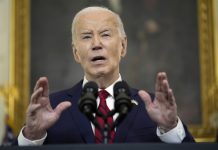KYIV, Ukraine (AP) — Paintbrush in hand, Anastasiya Sereda is working on a painting of a chubby-faced panda in the uniform of a Ukrainian soldier.
Propped on her easel is the reason why – a photo of her boyfriend Bohdan, a burly serviceman with a gentle smile.
“He looks like a panda,” Sereda said in explanation, alternately laughing and choking with tears as she talked about her partner, who was killed almost a year ago on the front line in eastern Ukraine. Taking part in an art class for women bereaved by war, she’s trying to capture her boyfriend’s humor and heroism, and channel her roiling emotions onto canvas.
Many other Ukrainians also are wrestling with a potent mix of emotions – including grief, anger, humor, defiance and fear – as they face a new phase in the war with growing concern about international support for their cause.
Most remain firm in their resolve to drive out the Russian invaders and decide their country’s future course. Many also worry that international attention is distracted by the Israel-Hamas war and other concerns, and that allies aren’t delivering much-needed weapons and ammunition. Foreign visitors are often told to go home with a message: Send air defenses, especially U.S.-made Patriot missiles, to close Ukraine’s skies to the enemy.
There are many grounds for worry. Russia has thrown waves of soldiers and deadly glide bombs at Ukrainian lines, forcing Kyiv’s troops to retreat from several villages along the 600-mile (1,000-kilometer) frontline in the country’s east and south. Military analysts say Russia is pushing to take as much territory as it ca n before fresh supplies of arms reach Ukraine from a $61 billion U.S. aid package approved in April.
Away from the front, air-raid sirens are a routine occurrence in much of the country as Russia attacks with missiles, rockets and drones. Sometimes the attacks hit energy plants, railways or other infrastructure. Often the targets feel indiscriminate: apartment buildings, hospitals, playgrounds. All mean more lives ripped apart.
“We really want the world to remember that people are dying right now,” said Valentyna, who works at a power station that has been repeatedly hit by Russian missiles. When air alerts send her to the plant’s basement shelter, she helps make camouflage netting to send to the troops, threading strips of green and gray cloth on a string frame.
“When there’s a siren you feel better if you’re doing something,” Valentyna said. The Associated Press agreed not to publish her full name because she works for critical national infrastructure.
Kyiv, Ukraine’s beautiful capital, is once again a bustling European city with modern conveniences from craft beer bars and hip coffee shops to ride-hailing apps and McDonald’s. Residents have adapted to war, and nowadays, few head for the shelter of the subway when air alarms sound.
But reminders of the dead are all around: in the sea of yellow and blue flags in Independence Square, and the memorial wall outside St. Michael’s Golden-Domed Monastery, where people leave flowers in front of photos of fallen troops.
As some Kyivites brunched on patios one spring Sunday, hundreds of others took to the streets for a demonstration to demand the release of Azov Brigade troops who were taken captive by Russia after defending the southern city of Mariupol two years ago. The weekly protests aim to ensure the POWs are not forgotten, and draw supportive honks from passing cars.
There’s a growing gap between those who serve and those who don’t, highlighted by a recent government decision to suspend passport renewal services for conscription-age men outside the country. Though human rights groups have criticized the move, many Ukrainians agree with the government that the move is a question of fairness.
And war also has brought solidarity, throwing together people from all walks of life and turning academics, scientists, writers and many others into soldiers.
Scores of people gathered in Kyiv’s central Independence Square on a rainy recent afternoon to say goodbye to Nazarii Lavrovskyi, a medical researcher turned army paramedic who was killed in April while helping to evacuate wounded troops.
University friends, fellow scientists from his lab researching antimicrobial drugs and battle-hardened soldiers all fell to one knee on the wet pavement as his coffin was carried from a hearse to the sound of military trumpet and drum.
“He joined us, and it was strange to see such people ending up in the war,” said Oleksii Palii, a veteran of Lavrovskyi’s unit, the 112th Separate Territorial Defense Brigade. “At first, he couldn’t cope at all, but later he became a combat medic. He earned tremendous respect from all the soldiers.
“Rest in peace, that’s how it turned out.”
With so much to worry about, many Ukrainians have put fears for the future on the back burner, said Anton Grushetskyi, executive director of the Kyiv International Institute of Sociology. There is concern about what a victory for Donald Trump in November’s U.S. presidential election could mean, given the Republican contender’s past praise of Russian President Vladimir Putin. But it’s not at the forefront of most people’s minds.
“People cannot (predict) their lives in a couple of months, even, because the situation is changing rapidly,” Grushetskyi said.
That sentiment was echoed by Olena Herhel, another member of the “Alive, true love stories” art project, where war widows find support and an outlet for their feelings. She joined the painting group after her husband was killed in the fighting almost two years ago.
“There is no point in making plans, because no one can say what will happen tomorrow,” she said. “My family just tries to get on with the tasks that we have for today.”
___
Associated Press journalists Illia Novikov and Volodymyr Yurchuk contributed to this story.
Source: post





